
Meet Noah Berkowitz
"Community service gave my life a bearing…"— Noah
Noah Berkowitz grew up in Marlboro, New Jersey and in New York. "Being exposed to community service early in life" is partly why he is very active with the Graduate Student Association of SNR-UNL, he explains in this interview. This influence stretches to the choice of his career path after graduate school. Read all about it!
What are you studying, and what informed your choice?
I’m studying Natural Resource Sciences, and emphasizing in Remote Sensing; if you like, remotely sensing crop yields. There’s a need for wider understanding of crop yield to make informed decisions. I’m working with Dr. Brian Wardlow and Dr. Daniel Uden as my advisors.
My hometown is Marlboro, New Jersey. It was a thriving agricultural city – with very fertile soil (named for its marl beds). It was well known for crops like potatoes and tomatoes. I recall while growing up that our neighbors reared horses and had sheep. But over the years, we have lost vast swathes of arable land due to urban sprawl. Statistics say that across the United States, farmland acreage has decreased by about 13 million acres since 2014! That’s an average loss of over 1.9 million acres (about twice the area of Rhode Island) yearly.
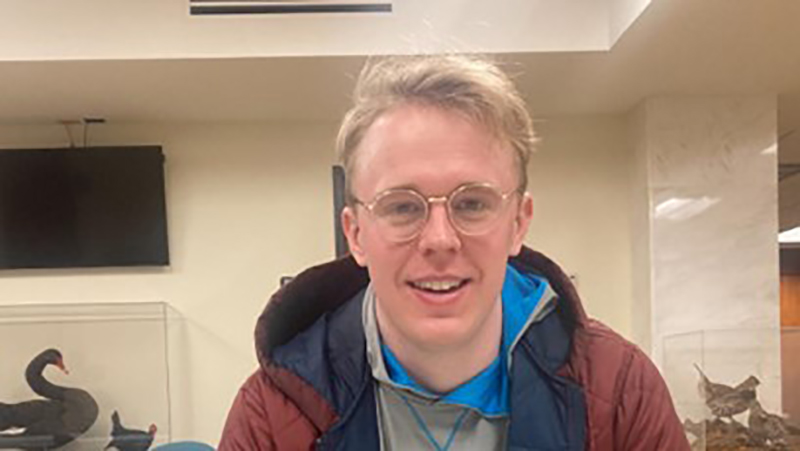
Now, these experiences are inextricably associated with my study. I’m researching the best approaches to ensuring an efficient use of land resources. The end is to see satellite imaging deployed in analyzing land productivity for crops and to decide early on the reallocation of the same piece of land to more productive use, like preservation/conservation.
It is commonplace to use large datasets stored in the NCCPI, a metric for potential productivity, but I can provide a modeled yield as a decision point.
How did you learn about this program and have your expectations been met?
I always knew that UNL was top notch on agriculture and remote sensing. But I was approached by a professor who asked me to apply. I saw it as the needed opportunity to grow further in my field. So, I applied and I’m here today.
One of the things that stand out for me at UNL are the members of faculty. These world-class professors are from a wide variety of fields and backgrounds. A good number have groundbreaking research and recognitions to their names. They bring with them this unique blend of experiences to the labs and the lecture halls. This combination opens the students up to a wealth of opportunities and extensive network such that we can conduct all sorts of research at local, state, and national level, with access to several study sites.
For me, this underscores the reason why UNL is a member of the Big 10 universities in the US.
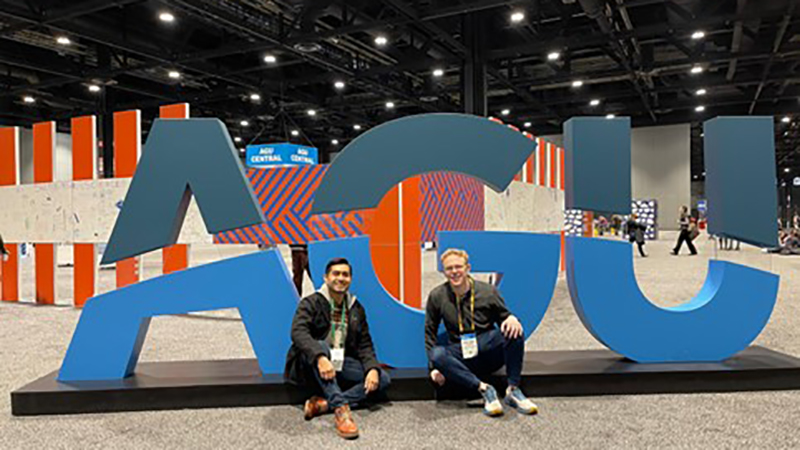
You light up and wear this huge grin when you speak about GIS. Why so much passion?
[Chuckles], I didn’t notice that.
I’m seeing a shift in my field, and it excites me to participate in my own little way as these developments occur.
Ten years ago, it wasn’t easy to obtain the sort of sophisticated data we have today. With cutting-edge technology we can obtain high-resolution imagery for GIS and remote objectives like never before.
The size of the dataset I must deal with is in terabytes. How do I get them?
I had to apply to the National Aeronautics and Space Administration (NASA) for free subscription; and I was lucky to be amongst those granted the privilege.
Interestingly, about a thousand satellites owned by private companies generate all sorts of data from outer space. It was not always so competitive. These are avenues to design and create data-rich maps that will attend to various human endeavors.
Have you had any major challenge while pursuing your Ph.D?
Not really. But there was this isolated event that got me irked. I had generated data across some years, and when I ran it, the harvest index turned out lower than expected. The yield was abnormally low. So, I panicked for some days and sought solutions everywhere I could.
Finally, someone drew my attention to a historical dataset that was skewed, and he explained the reason for that. It established the fact that nothing was wrong with my modeling. In the referenced year, there was a prevalence of hail, and it affected general yield.
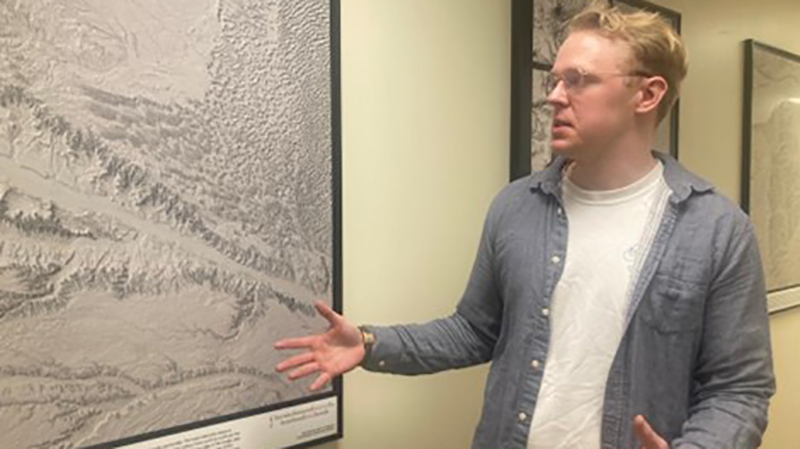
How do you manage the stress with Ph.D?
The life of a Ph.D. student can be particularly challenging.
I do my best to retain people who exude positive energies around me. I’ve been lucky to have three fantastic flat mates. The vibe is always positive. Also, the people at SNR are quite encouraging. I have been able to balance these two years of intense studies and research with the exciting camaraderie I enjoy from lab mates and the GSA.
Besides these, it's also good to know that the bars are always open.
I like to see the museums, whether here in Lincoln or Omaha – I just like the feel.
Prior to UNL, what other schools did you attend?
My undergrad schooling was in the Philadelphia/South Jersey area, where I obtained dual degrees in Applied Planning and Geography. After that, I pursued a master’s degree in Geospatial Information Sciences for International Development at Clark University. My research was on geospatial applications in machine learning, international issues, and health. A memorable part of my work was building a model to help protect the mangrove ecosystem, which has continued to face global degradation.
Those were the days I developed some fundamental skills and became dexterous with tools like ArcGIS, TerrSet, Q-GIS, and several other open-source software.
Without technical jargons, how would your research benefit society?
This research would help identify areas with marginal yield and unprofitable fields. Equipped with that information, farm owners can make sound decisions to convert the existing use of these spaces into economically viable alternatives. From planting drought-resistant crop, soil rotational practices to the introduction of more beneficial use, like conservation – there are several options to explore when the model informs the landowner of the need for a switch.
How often do you volunteer for community service?
I’m passionate about volunteering. Being exposed to community service early in life has shaped my views to a lot of things. I have volunteered in different capacities since high school days. In 2015, I was enlisted as a “Geomentor”. It’s a program overseen by the American Association of Geographers and the Environmental Systems Research Institute (ESRI). These bodies created the curriculum to help kids in public schools between grades 6 to 12 get acquainted with GIS software, data, and the basics of GIS and remote sensing. I’m still registered here in Lincoln and in Omaha as a Geomentor.
Like you know, I head the Safety and Facility Committee of the Graduate Student Association (GSA) here at the School of Natural Resources. We are tasked with giving Hardin Hall surrounding a befitting look based on the feedback we get from students. The essence is to incorporate changes that make students feel safe and comfortable. You would have noticed a facelift in the students’ lounge and our work area.
I’m also responsible for the sporting arm of our GSA. Later this semester, we’ll hopefully be enrolling our SNR Grad team for soccer and volleyball. The feedback from interested students has been overwhelming.
We will hopefully register in Unified Soccer, a Special Olympics Unified sport. It is an avenue for students to spend valuable time with the Special Olympics community here in Nebraska.
These teams and activities will help foster better community within SNR and with the broader Lincoln community.
During my Master’s program, I assisted the rollout of a mobile resources van for people suffering from addiction. This was done in collaboration with the City of Worcester Division of Public Health. The program developed my applied GIS knowledge as I attended to a significant public health challenge. Using GIS/Remote Sensing for health-related topics can dramatically change a community for the better. I believe we must think about the communities that we live and work in as graduate students.
Sounds like you’re a sports enthusiast also.
Yes!
My love for sporting activities includes soccer and rowing, including our Rowing team at UNL. I’m a huge fan of NY sports teams, including the New York Mets, Jets, and a couple of others.
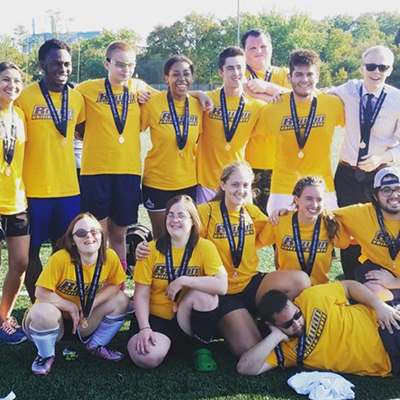
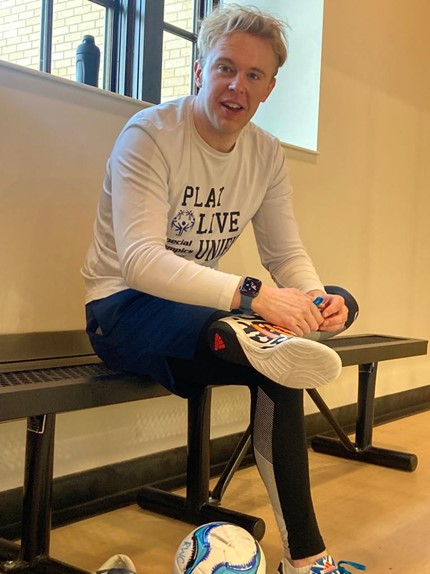
What do you plan to do after graduating?
I do not intend to shoehorn myself into existing roles and just become one of the numbers because I want to eke out a living. I plan to deploy the acquired knowledge from here, along with my developed skill set from various research activities and work experience, into helping smallholder agriculture across low-income countries. Perhaps I’ll pursue this dream under the aegis of an NGOs or a government-sponsored project.
What do you miss about your hometown?
I’ve been gone for two years now, and I miss my family back in the New York area. New York is like the real home to me. Nevertheless, I speak with my mom over the phone daily. They miss me too, and there’s a plan to visit me here in Nebraska. We’ll see Kansas and Omaha together.
I miss my siblings too. I have a brother who runs a hospital and a sister who teaches at a local school. Both are older than me and have graduate degrees. I also miss my family's dogs - I’m not sure they would like the cold winters in Nebraska.
I miss delicacies like “bagels”, “challah”, “hot pot”, et cetera. I’m Jewish, and these are typical foods we enjoy. New York has a thriving Jewish community, so finding eateries with our cultural delicacies is not tricky. That’s not to say there are no substitutes here in Lincoln. I’m just having a hard time with my taste buds. But I do enjoy steaks, burgers, and maybe a Runza every so often.
Who are your mentors?
I’ve encountered some amazing people who have made significant impacts in my life. There’s Dr. Zachary Christman – he laid the foundation of my exploits today in Geography. He was my advisor as an undergraduate.
During my master’s degree, I was also under the tutelage of Dr. J. Ronald Eastman. His impact on my academic career also was huge. I’ve been rewarded with great people throughout my studies.
My committee here has played a massive role in my development as a Ph.D. student as well. They include Dr. Andrea Basche and Dr. Trenton Franz, Dr. Brian Wardlow, and Dr. Daniel Uden.
— by Jerome Okojokwu-Idu, SNR Graduate student